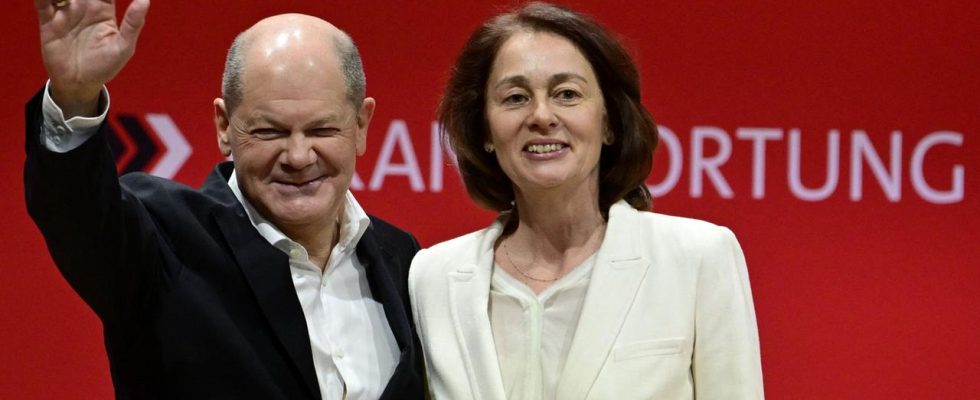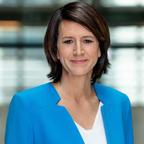The SPD is today deciding on the program and top staff for the European elections. She has to explain to the Germans what she stands for in European politics. She hasn’t done that for a long time – will she be able to do it so quickly?
You can drive hundreds of kilometers through Germany without coming into contact with social democratic European politics, that is appalling, writes SPD MP Axel Schäfer. The Bochum politician sent an incendiary letter to his comrades at the beginning of the year.
In it, he takes aim at his SPD, which has failed for years to incorporate European policy into everyday work and to fill relevant EU positions. Even at the federal party conference, discussions about European policy were first put at the end of the agenda and then postponed.
Chancellor as a driving force
Comrade Schäfer from Bochum is a long-time companion of Katarina Barley, the SPD’s top candidate in the European election campaign. Barley smiles mildly at such incendiary letters. But she agrees with Schäfer on one point. He had also written: “As German Chancellor, Olaf Scholz has achieved more in terms of European policy in such a short time than any head of government before him.”
Barley is relying on Scholz in the election campaign. The one who is not necessarily known for his strong communication skills and good survey results. But the SPD wants Scholz and Barley to be the faces of the European election campaign. Can this work given the poll numbers?
SPD top candidate Barley elected
The Vice President of the European Parliament, Katarina Barley, is leading the SPD as the top candidate in the European elections on June 9th. At the delegate conference in Berlin she was elected with 98.66 percent of the votes.
“Some people might want us to distance ourselves from the Chancellor, but there is absolutely no reason for that,” says SPD General Secretary Kevin Kühnert. That would simply be “crazy”. If you ask 100 people on the street what they think of when it comes to the SPD, it would be Scholz, the SPD Chancellor.
When the Chancellor talks about the EU, he says that Europe is the answer to the crises of the time. It stands for peace and security, for the hope of good work.
When he stood with Katarina Barley in the Willy Brandt House last September, he wanted above all to show how much they exchanged ideas. Scholz said he spoke to Barley on the phone very often, almost every week. We also meet often and will certainly become more so in preparation for the European elections.
Not a “riot and remmidemmi woman”
This means that two Social Democrats will now be visible in the European election campaign who are better known for their quiet tones. Barley is “not a riotous and remorseless woman,” says General Secretary Kühnert, describing the top candidate.
She is someone who sometimes turns the regulator down again in times of loud sounds and enormous volume. But also someone who has a lot of control when it comes to the rule of law and can also draw red lines when it comes to right-wing extremism.
Her biography seems like the picture book of a European politician. Born into a German-British family, she brought a law diploma with her from a stay abroad in Paris, her first marriage was to a Spaniard, and she is now married to a Dutchman.
Barley was SPD general secretary, family and justice minister. Five years ago she ran for the first time as the SPD’s top candidate for Brussels. However, the result was miserable: At that time, the Social Democrats achieved their worst result ever with 15.8 percent. Why should it work better this time?
Barley says so ARD capital studio, she believes that social democratic values are particularly in demand right now. “Whenever fascism and authoritarian regimes emerged, it was the social democrats who opposed them most resolutely.”
In Europe, however, there are signs of a development in favor of right-wing populist and right-wing extremist parties – whether in Sweden or Finland, in Italy or the Netherlands. At the AfD’s European party conference in Magdeburg, it was said confidently: “Nobody can get past us in the next European Parliament.”
Barley replies: “The people have it in their hands.” Women’s rights, social benefits, the fight against climate change: there is a lot at stake. She refers to the “Correctiv” research on “remigration,” which recently triggered mass demonstrations. “It is very important that we open our eyes and realize what is really happening.”
Mobilization with social issues
In the election campaign, the SPD is relying on a positive narrative about Europe, not on attacks against the supposedly distant, over-bureaucratized Brussels. She wants to talk less about crisis and more about crisis management. “We are strengthening trade unions, co-determination and thus employee rights from Europe,” says Barley. Not to forget the minimum wage policy.
SPD General Secretary Kevin Kühnert also points to the goal of a Europe-wide corporate tax of at least 15 percent. In addition, Europe has managed to create a new set of rules when it comes to migration. This is a “huge success,” says Barley. However, not everyone in the SPD sees it that way, and the young Jusos organization in particular is heavily critical of it.
The fear of a reminder election
However, it is also conceivable that the European elections could become a reminder for the government and chancellor. General Secretary Kühnert warns against this: “The democratic parties are required to really put their programs to the vote, not just to do a small simulated federal election campaign,” he says ARD capital studio.
Berhard Kempf, RBB, tagesschau, January 28, 2024 10:20 a.m


